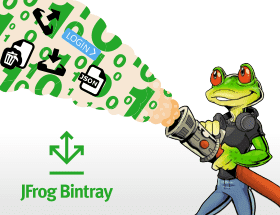Time is of the essence: Make an impact using Firehose Events
 Have you ever experienced the drive you get when you act on a sudden opportunity that really makes a valuable impact on something? On the other hand, have you ever experienced the disappointment of a missed opportunity?
Have you ever experienced the drive you get when you act on a sudden opportunity that really makes a valuable impact on something? On the other hand, have you ever experienced the disappointment of a missed opportunity?
Let’s face it, every user action can be translated into a short window of opportunity that requires our attention, otherwise, it will be lost forever. Every department in an organization is responsible for ensuring the best possible user experience, and many times we only get one chance to create an impactful initial impression that really makes the difference. So, how can we do this? One of the ways to do this is using JFrog Bintray’s Firehose Events.
We are constantly tracking, measuring and analyzing our user’s behaviors. Most of the time we look back at the user activity that has already happened and try to figure out where we can make improvements. For example, we can measure the number of downloads for any given time, and get valuable insights into the usage of our repositories using JFrog Bintray’s Premium Dashboard. We can even use Live Logs to get detailed stats, including a live download feed as it happens. But what about looking at what’s happening right now, in real-time
What are firehose events?
Bintray’s Firehose Events API enables us to receive live notifications (event triggers / user actions) for a variety of interactions with repositories, and respond to them in real-time with automated activities. Here are the events that you can register for, and some interesting things you can do with them:
- Successful and failed logins: Repeated failed login attempts for scoped users can trigger an email alert to administrators
- Downloading a file/artifact: Successful downloads can trigger an engagement email
- Uploading a file/artifact: Very large uploads can trigger an email alert
- Usage thresholds: Approaching the storage limit for your repositories can trigger an instant message
- Deleting a file/artifact: Deleted packages can trigger an alert
Wrapping up with JFrog CLI
Yet again, JFrog CLI provides a convenient and simple interface for your automation scripts. It wraps the Firehose Events API and connects to an Event Notification Stream offering two main advantages in doing so:
- Automatic reconnect: If the connection to Bintray is lost, JFrog CLI will automatically reconnect you to make sure that none of the events are lost.
- Event filtering: You might not be interested in all the events coming out of the firehose. The CLI lets you filter out events, by event type, letting you focus only on those that are interesting to you.
Let’s take a look at a simple example. We can use the Firehose Events API to post to a Slack channel and provide a live stream of notifications.
To get events posted to a slack channel, all you have to do is first create a Slack channel, then connect to the event notification stream (Firehose), and pipe the stream to the Slack channel using something as simple as cURL calling the Slack API.
This example uses Bash, JFrog CLI, jq, and cURL. First, you’ll need to install JFrog CLI. Then wrap the following snippet within a script, and run it:
# Connect to the event notification stream ./jfrog bt st --user= --key= --include="download" | while read line do # Extract the path from the whole event response path=$(echo $line | jq .path -r) curl -H"Content-Type:application/json" --data "{\"text\":\"File Downloaded: $path\"}" done
This is just a simple example of how you can react to Firehose API events. The more creative and inventive Bintray users may come up with ideas like running analytics, creating live graphs and dashboards, issuing relevant alerts, and anything else your imagination can conjure up.



